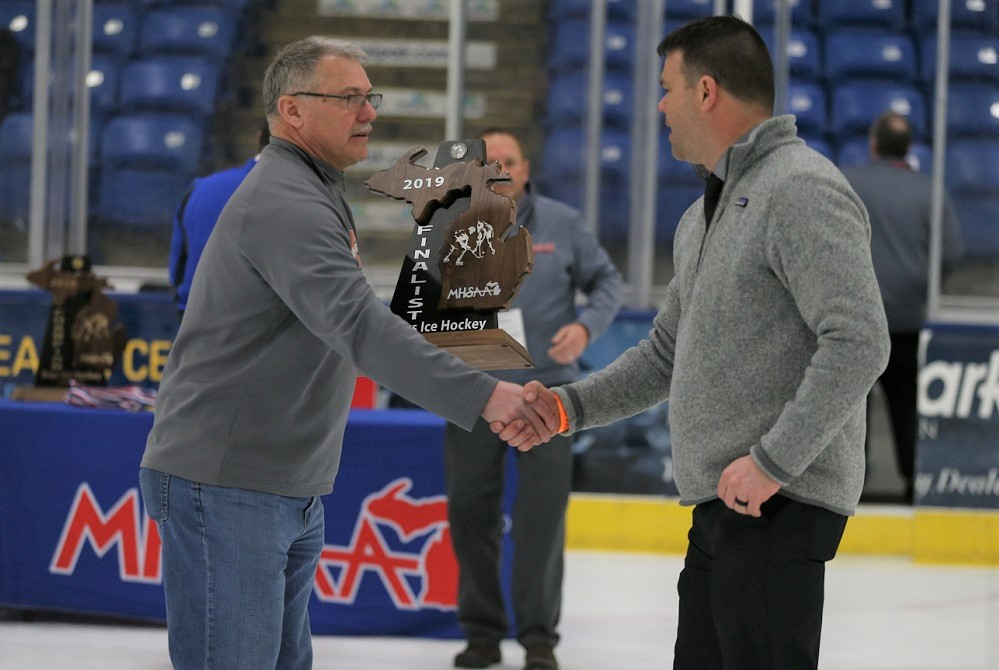
Athletes: Prepare to Beat the Heat
August 4, 2014
By Geoff Kimmerly
Second Half editor
Despite unseasonably cool temperatures this summer in Michigan, high school athletes should prepare for the heat that usually accompanies August and the beginning of Michigan High School Athletic Association fall practices as they kick off next week.
Each year, the MHSAA provides information to its member schools to help them prepare for hot weather practice and game conditions in the late summer and early fall. Football practice can begin August 11, followed by first practices for all other fall sports August 13.
The topic of heat-related injuries receives a lot of attention at this time of year, especially when deaths at the professional, collegiate and interscholastic levels of sport occur, and especially since they are preventable in most cases with the proper precautions. In football, data from the National Federation of State High School Associations shows that nationally 41 high school players died from heat stroke between 1995 and 2013.
Many MHSAA schools this fall are expected to again follow the MHSAA’s Model Policy for Managing Heat & Humidity that directs schools to monitor heat index prior to and during activity and recommends actions based on those readings.
Also this school year, for the first time, the MHSAA is requiring all assistant and subvarsity coaches at the high school level to complete the same rules and risk minimization meeting requirement as high school varsity head coaches, or, in the alternative, one of several online courses designated for this purpose on MHSAA.com.
“It’s not an accident that causes severe heat illness and death. It’s a lack of attention to what should’ve been taking place, a lack of preparation,” said John E. “Jack” Roberts, executive director of the MHSAA. “We’re trying to communicate to our constituents that if we make the precautions that we should, plan as we should, we will have none of these tragedies in school sports.”
The MHSAA Representative Council adopted in 2013 the Model Policy for Managing Heat & Humidity that, while not mandated for member schools, has been adopted by many at the local level. The plan directs schools to begin monitoring the heat index at the activity site once the air temperature reaches 80 degrees and provides recommendations when the heat index reaches certain points, including ceasing activities when it rises above 104 degrees.
The model policy is outlined in a number of places, including the publication Heat Ways, which is available for download from the MHSAA Website. Heat Ways not only provides the model policy, but addresses the need for proper acclimatization in hot weather.
Heat, hydration and acclimatization also are again focuses of the MHSAA’s required preseason rules meetings for coaches and officials. The online presentation discusses the need for good hydration in sports, regardless of the activity or time of year.
The Health & Safety Resources page of the MHSAA Website has a number of links to different publications and information and a free online presentation from the National Federation of State High School Associations. Visit MHSAA.com, click on “Schools” and then on “Health & Safety Resources” to find the information.
Roberts said the first days of formal practices in hot weather should be more for heat acclimatization than the conditioning of athletes, and that practices in such conditions need planning to become longer and more strenuous over a gradual progression of time.
He added schools also must consider moving practices to different times of day, different locations, or change practice plans to include different activities depending on the conditions.
“I think all schools need to prepare themselves in these ways,” Roberts said. “They need to educate participants, parents and coaches about proper hydration and the dangers of practicing and competing when the heat and humidity are too high.”

Hockey Star-Turned-Champion for School Sports to Receive MHSAA's Forsythe Award
By
Geoff Kimmerly
MHSAA.com senior editor
March 11, 2022
Once or twice a year, Bruce Horsch gets the question – mostly during a Winter Olympics year or after someone has watched “Miracle on Ice” and found out the “Horsch” that is mentioned twice is actually the recently-retired Houghton High School athletic director.
The final goaltender cut from the 1980 U.S. hockey team that went on to stun the world in winning Olympic gold, Horsch went on to coach at multiple college programs before becoming Houghton’s athletic director in 1996 at the age of 40.
These days, many also know him for the commitment, mentorship and leadership shown in that position through his retirement in 2019.
To celebrate his many contributions to interscholastic athletics, Horsch has been named the 2022 honoree for the Michigan High School Athletic Association’s Charles E. Forsythe Award.
 The annual award is in its 45th year and named after former MHSAA Executive Director Charles E. Forsythe, the Association's first full-time and longest-serving chief executive. Forsythe Award recipients are selected each year by the MHSAA Representative Council, based on an individual's outstanding contributions to the interscholastic athletics community.
The annual award is in its 45th year and named after former MHSAA Executive Director Charles E. Forsythe, the Association's first full-time and longest-serving chief executive. Forsythe Award recipients are selected each year by the MHSAA Representative Council, based on an individual's outstanding contributions to the interscholastic athletics community.
Horsch was described as a “not in the spotlight guy” by one of those who recommended him for the Forsythe Award, but he certainly spent time there. Horsch was a college hockey star and NHL draft pick, and had begun his minor league hockey career before playing with the U.S. team right up until the final cuts on the way to Lake Placid, N.Y.
After his playing days concluded, he coached collegiately before eventually settling in as Houghton’s athletic director for the 1996-97 school year.
“I was fortunate enough to play at Michigan Tech, and I was on a national championship team (in 1975) and I was on a national runner-up team (in 1976). When you played for (coach) John MacInnes up here, it wasn’t individuals – although we had great individuals – we won because we were a team” Horsch said.
“I’m not out for recognition. I enjoy being part of a team. I enjoy working with other people, and that’s my satisfaction.”
He led many important ones in his roles as a school sports administrator.
Horsch was named his region’s Athletic Director of the Year in both 2003 and 2019 by the Michigan Interscholastic Athletic Administrators Association (MIAAA), and served on the Upper Peninsula Athletic Committee from 2001-05. He has been an active member of the MIAAA, National Interscholastic Athletic Administrators Association (NIAAA) and Upper Peninsula Athletic Directors Association (UPADA), serving as secretary and president of the UPADA.
He also served as president of the Keweenaw Area Athletic Directors Association and secretary and commissioner of the Western Peninsula Athletic Conference.
“For years Bruce was one of the most respected voices not only in the Upper Peninsula but also the entire state,” MHSAA Executive Director Mark Uyl said. “He brought that perspective as a high-end athlete and transitioned extremely well as an educator and athletic director.”
Horsch was a frequent host of MHSAA Tournaments at the District and Regional rounds during his time at Houghton, and also hosted MHSAA Upper Peninsula Finals. He served as a host for sessions of the MHSAA PACE program, the coaching education program predecessor to the current Coaches Advancement Program (CAP).
His dedication to Houghton athletics was further noted when he considered retiring in 2017 but stayed on two more years to assist with a bond that resulted in in the upgrading of the school’s football field and track and building of softball and baseball fields as part of the athletic complex. Previously, he had led a referendum to have a second gymnasium built to provide an additional practice venue with girls basketball moving from the fall to winter season beginning with the 2007-08 school year.
“I’m proud of the fact that in the U.P. there are not many, if any schools that have the facilities that Houghton High School has,” Horsch said.
Horsch is a graduate of Hastings High School in Minnesota and earned a bachelor’s degree in business administration from Michigan Technological University. He led the Huskies hockey team to 58 victories in goal over four seasons and was part of the 1975 NCAA championship team, two of many reasons he was inducted into the Michigan Tech Sports Hall of Fame in 2007. He was drafted by the Montreal Canadiens during the ninth round of the 1976 NHL draft and played minor league hockey for two seasons. He then coached hockey collegiately for most of the 1980s as an assistant at Ferris State and then Michigan Tech.
He has continued to serve his community as a member of the Rotary Club of Houghton.
Past recipients of the Charles E. Forsythe Award
1978 - Brick Fowler, Port Huron; Paul Smarks, Warren
1979 - Earl Messner, Reed City; Howard Beatty, Saginaw
1980 - Max Carey, Freesoil
1981 - Steven Sluka, Grand Haven; Samuel Madden, Detroit
1982 - Ernest Buckholz, Mt. Clemens; T. Arthur Treloar, Petoskey
1983 - Leroy Dues, Detroit; Richard Maher, Sturgis
1984 - William Hart, Marquette; Donald Stamats, Caro
1985 - John Cotton, Farmington; Robert James, Warren
1986 - William Robinson, Detroit; Irving Soderland, Norway
1987 - Jack Streidl, Plainwell; Wayne Hellenga, Decatur
1988 - Jack Johnson, Dearborn; Alan Williams, North Adams
1989 - Walter Bazylewicz, Berkley; Dennis Kiley, Jackson
1990 - Webster Morrison, Pickford; Herbert Quade, Benton Harbor
1991 - Clifford Buckmaster, Petoskey; Donald Domke, Northville
1992 - William Maskill, Kalamazoo; Thomas G. McShannock, Muskegon
1993 - Roy A. Allen Jr., Detroit; John Duncan, Cedarville
1994 - Kermit Ambrose, Royal Oak
1995 - Bob Perry, Lowell
1996 - Charles H. Jones, Royal Oak
1997 - Michael A. Foster, Richland; Robert G. Grimes, Battle Creek
1998 - Lofton C. Greene, River Rouge; Joseph J. Todey, Essexville
1999 - Bernie Larson, Battle Creek
2000 - Blake Hagman, Kalamazoo; Jerry Cvengros, Escanaba
2001 - Norm Johnson, Bangor; George Lovich, Canton
2002 - John Fundukian, Novi
2003 - Ken Semelsberger, Port Huron
2004 - Marco Marcet, Frankenmuth
2005 - Jim Feldkamp, Troy
2006 - Dan McShannock, Midland; Dail Prucka, Monroe
2007 - Keith Eldred, Williamston; Tom Hickman, Spring Lake
2008 - Jamie Gent, Haslett; William Newkirk, Sanford Meridian
2009 - Paul Ellinger, Cheboygan
2010 - Rudy Godefroidt, Hemlock; Mike Boyd, Waterford
2011 - Eric C. Federico, Trenton
2012 - Bill Mick, Midland
2013 - Jim Gilmore, Tecumseh; Dave Hutton, Grandville
2014 - Dan Flynn, Escanaba
2015 - Hugh Matson, Saginaw
2016 - Gary Hice, Petoskey; Gina Mazzolini, Lansing
2017 - Chuck Nurek, Rochester Hills
2018 - Gary Ellis, Allegan
2019 - Jim Derocher, Negaunee; Fredrick J. Smith, Stevensville
2020 - Michael Garvey, Lawton
2021 – Leroy Hackley Jr., Byron Center; Patti Tibaldi, Traverse City
PHOTO: Houghton athletic director Bruce Horsch, left, hands coach Corey Markham the Division 3 finalist trophy after the Gremlins finished Division 3 hockey runners-up in 2019.

